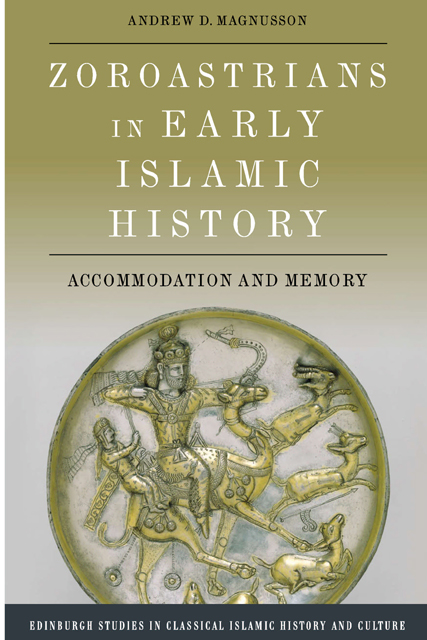Book contents
- Frontmatter
- Contents
- Acknowledgements
- A Note on Transliteration and Abbreviation
- Dedication
- Introduction: Zoroastrianism, Islam and Accommodation
- 1 Myth and Countermyth in Zoroastrian Historiography
- 2 Umar’s Dilemma: The Taxation of People Without a Book
- 3 Marriage, Meat and the Limits of Accommodation
- 4 Salman’s Charter as a Site of Memory
- 5 Fire Temple Desecration and Triumphal Tales of Violence
- 6 Rhetorical Zoroastrians in Early Islamic Discourse
- Conclusion: An Ambivalent Accommodation
- Appendix A Translation of an Iranian Recension of Salman’s Charter
- Appendix B Translation of an Indian Recension of Salman’s Charter
- Bibliography
- Index
6 - Rhetorical Zoroastrians in Early Islamic Discourse
Published online by Cambridge University Press: 25 April 2023
- Frontmatter
- Contents
- Acknowledgements
- A Note on Transliteration and Abbreviation
- Dedication
- Introduction: Zoroastrianism, Islam and Accommodation
- 1 Myth and Countermyth in Zoroastrian Historiography
- 2 Umar’s Dilemma: The Taxation of People Without a Book
- 3 Marriage, Meat and the Limits of Accommodation
- 4 Salman’s Charter as a Site of Memory
- 5 Fire Temple Desecration and Triumphal Tales of Violence
- 6 Rhetorical Zoroastrians in Early Islamic Discourse
- Conclusion: An Ambivalent Accommodation
- Appendix A Translation of an Iranian Recension of Salman’s Charter
- Appendix B Translation of an Indian Recension of Salman’s Charter
- Bibliography
- Index
Summary
The Arabic term ‘Zoroastrians’ (majūs) frequently features in early Islamic discourse as a synonym for ‘Other’. Muslims used it to describe groups they perceived as pagan, heretical or deviant. Hence the following report about ‘Zoroastrian’ Berbers occasionally appears in Islamic taxation literature:
As for the Zoroastrians, the Messenger of God, may God bless him, accepted jizya from the Zoroastrians of Hajar on the condition that the meat slaughtered by them is impermissible, as is marrying their women. When Khālid ibn al-Walīd was the agent (‘āmil) of Abū Bakr, he demanded [jizya] from the people of Iraq, who were Zoroastrians, in his letter to their Sasanian governors (marāzibatihim). ‘Umar ibn al-Khaṭṭāb accepted [jizya] from them thereafter, and after him ‘Uthmān ibn ‘Affān also accepted it from them and from the Berbers, who were Zoroastrians (al-barbar wa-kānū majūsan).
Who were these Zoroastrian Berbers that Uthman taxed? Abu Ubayd ibn Sallam (d. 224/838) identifies them as the Lawata people of Barqa and the Pentapolis of Cyrenaica, in what is now Libya. That location places them beyond the plausible reach of Sasanian Zoroastrianism. Why, then, did early Muslims call these Berbers ‘Zoroastrians’? In what ways were they like Zoroastrians?
Previous scholars have asserted that Muslims used this descriptor to justify accepting jizya from People without a Book – that is, adherents of neither Judaism nor Christianity – since Umar had set that precedent with Zoroastrians (see Chapter Two). From a legal perspective, it relieved them of the theoretical obligation to fight these groups because Muhammad had taxed them. Yet it is likely that in this case the Berbers’ association with Zoroastrianism was the result of a simple error in transmission. The following version of the same report appears far more frequently in the early Islamic taxation literature:
Yaḥyā ibn Ayyūb told me on the authority of Yūnus ibn Yazīd al-Aylī on the authority of Ibn Shihāb that the Messenger of God, may God bless him, collected jizya from the Zoroastrians of Hajar and that ‘Umar collected jizya from the Zoroastrians of Persia, and that ‘Uthmān collected jizya from the Berbers.
In other words, the first caliphs accepted tax from Zoroastrians and Berbers – not from Zoroastrian Berbers.
- Type
- Chapter
- Information
- Zoroastrians in Early Islamic HistoryAccommodation and Memory, pp. 136 - 158Publisher: Edinburgh University PressPrint publication year: 2022



